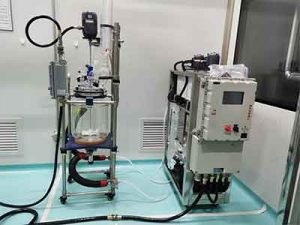water cooled industrial chillers
Water-Cooled Industrial Chillers: Efficient Cooling for High Thermal Output
Water-cooled industrial chillers are engineered to provide efficient and reliable cooling in industrial applications where high thermal output is a common challenge. These chillers use water as a cooling medium, offering a broad range of cooling capacities and high energy efficiency. They are particularly well-suited for indoor applications in chemical plants, manufacturing facilities, and medical facilities where precise temperature control is crucial.

Features of Water-Cooled Industrial Chillers
Compact Size and High Energy Efficiency: Water-cooled chillers are designed to be compact while offering high energy efficiency. They are an excellent choice for indoor applications where space is at a premium but cooling demands are high.
Broad Cooling Capacity: These chillers offer a broad cooling capacity range, from 10 to 4,000 tons, making them suitable for a variety of industrial applications with different thermal output requirements.
Low Environmental Impact: Many manufacturers are developing water-cooled chillers that use low Global Warming Potential (GWP) refrigerants, such as HFOs or natural refrigerants like CO2, to reduce the environmental impact of these systems.
Advanced Controls: Modern water-cooled chillers are equipped with advanced control systems, such as the Elektronikon® MkV Touch controller, which provide intuitive control and remote monitoring capabilities, ensuring optimal performance and efficiency.

Ease of Maintenance: Water-cooled chillers are designed for ease of maintenance, with features like fully hermetic scroll compressors and weatherproof canopies that protect internal components from the elements.
Applications of Water-Cooled Industrial Chillers
Chemical Plants: In chemical plants, water-cooled chillers are used to control the temperature of processes and equipment, ensuring safety and efficiency.
Manufacturing Facilities: These chillers are extensively employed in manufacturing facilities to cool machinery, control ambient temperatures, and maintain optimal conditions for production.
Medical Facilities: In medical facilities, such as laboratories and cleanrooms, water-cooled chillers provide precise temperature control necessary for various processes and equipment.
Food and Beverage Industry: Water-cooled chillers are also used in the food and beverage industry for cooling processes, ensuring product quality and consistency.
Maintenance and Operational Considerations
Proper maintenance is essential for the reliable operation of water-cooled industrial chillers. This includes regular inspections of the condenser and evaporator coils, checking the refrigerant levels, and ensuring that the compressor and motor are functioning correctly. It is also important to monitor the water quality in the cooling system to prevent scaling and corrosion, which can reduce efficiency and lead to component failure.

Operational considerations include ensuring that the chiller is sized correctly for the application and that the system is designed to handle the expected cooling loads. It is also important to consider the ambient temperature range when selecting a chiller, as this will affect its performance and efficiency.
Market Trends and Innovations
The market for water-cooled industrial chillers is characterized by a high degree of product innovation. Manufacturers are developing chillers with features such as energy efficiency, expandability, compact design, and wireless technology, which are crucial for success in the market. The demand for water-cooled chillers is driven by the need for intelligent and energy-efficient systems with a low environmental impact.
Innovations in water-cooled chiller technology are focused on enhancing energy efficiency and sustainability. This includes the development of chillers with free-cooling sections and patented adiabatic pre-cooling on inlet, which can significantly reduce energy consumption and meet the highest levels of energy saving.
Conclusion
Water-cooled industrial chillers offer a high-performance cooling solution for applications with high thermal output. Their compact size, high energy efficiency, and broad cooling capacity make them an attractive option for a variety of industrial settings. As technology continues to advance, these chillers are becoming even more efficient and sustainable, ensuring that they remain a key component in the cooling strategies of industrial facilities around the world. Regular maintenance and staying informed about the latest advancements will ensure that water-cooled industrial chillers continue to provide effective cooling for years to come.
Related recommendations
How to Take Antifreeze Protection Measures for Industrial Chillers in Winter?
1660How to Take Antifreeze Protection Measures for Industrial Chillers in Winter? The temperature is low in winter. We know that many machinery and instruments need antifreeze protection measures...
View detailselectronic test systems
835Electronic Test Systems: Ensuring Reliability and Performance Electronic test systems play a pivotal role in the design, development, and manufacturing of electronic devices and systems. These ...
View detailssmall chillers
651Small Chillers: An Overview Definition and Working PrincipleSmall chillers are cooling systems that use mechanical vapor compression to transfer heat from a lower temperature reservoir to a hig...
View details1.5 hp glycol chiller
764Understanding 1.5 HP Glycol Chillers A 1.5 HP glycol chiller is an air-cooled chiller system designed for low-temperature operations and high flow, commonly used in breweries and distilleries t...
View details
 LNEYA Chiller
LNEYA Chiller






HelloPlease log in